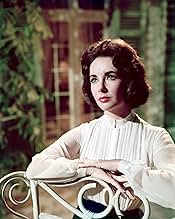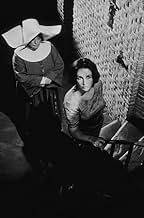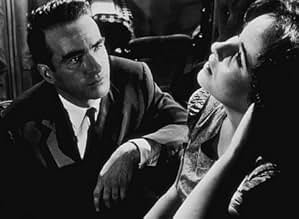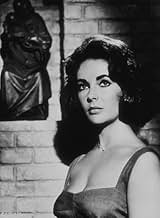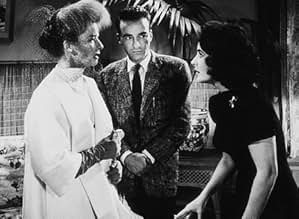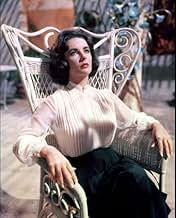PUNTUACIÓN EN IMDb
7,5/10
18 mil
TU PUNTUACIÓN
A un cirujano se le asigna el caso de una joven cuya tía quiere que sea lobotomizada para encubrir un secreto familiar.A un cirujano se le asigna el caso de una joven cuya tía quiere que sea lobotomizada para encubrir un secreto familiar.A un cirujano se le asigna el caso de una joven cuya tía quiere que sea lobotomizada para encubrir un secreto familiar.
- Dirección
- Guión
- Reparto principal
- Nominado para 3 premios Óscar
- 4 premios y 7 nominaciones en total
Sheila Robins
- Dr. Hockstader's Secretary
- (as Sheila Robbins)
Erik Chitty
- Asylum Inmate
- (sin acreditar)
Grace Denbeigh-Russell
- Asylum patient
- (sin acreditar)
Brenda Dunrich
- Nurse
- (sin acreditar)
Eddie Fisher
- Street Urchin
- (sin acreditar)
Anthony Lang
- Inmate
- (sin acreditar)
Aileen Lewis
- Nurse
- (sin acreditar)
Reseñas destacadas
In 1930's New Orleans, a wealthy and eccentric older woman named Mrs. Venable (Katharine Hepburn), wants a surgeon (Montgomery Clift) to perform a lobotomy on her niece (Elizabeth Taylor), for reasons that become clear toward the end of the film. This macabre Tennessee Williams story, with overlapping adult themes, must surely have been a shock to audiences in 1959. The film provides a great vehicle for the talents of both Hepburn whose acting is engaging, and Taylor whose performance is superb.
The Mankiewicz script is very talky. The characters of both Hepburn and Taylor engage in lengthy and at times tedious monologues. In all that talking, at least there are some really good lines. My favorite is near the beginning. In a nonchalant tone, Mrs. Venable tells us about the daily vicissitudes of Lady, the Venus flytrap that Mrs. Venable keeps in her garden. "Lady must be kept under glass, and while she is under glass, we have to provide her with flies, flown in at great expense." Priceless.
As one would expect for a film derived from a stage play, cinematography and music are less important than dialogue and acting. "Suddenly Last Summer" is worth viewing for its unusual story, and for the acting accomplishments of Hepburn and Taylor.
The Mankiewicz script is very talky. The characters of both Hepburn and Taylor engage in lengthy and at times tedious monologues. In all that talking, at least there are some really good lines. My favorite is near the beginning. In a nonchalant tone, Mrs. Venable tells us about the daily vicissitudes of Lady, the Venus flytrap that Mrs. Venable keeps in her garden. "Lady must be kept under glass, and while she is under glass, we have to provide her with flies, flown in at great expense." Priceless.
As one would expect for a film derived from a stage play, cinematography and music are less important than dialogue and acting. "Suddenly Last Summer" is worth viewing for its unusual story, and for the acting accomplishments of Hepburn and Taylor.
10robb_772
Long-fabled as one of the most bizarre films to come out Hollywood during the years of the Production Code's strict enforcement, SUDDENLY, LAST SUMMER is a riveting psychological drama that remains absolutely gut-wrenching even after nearly fifty years since it's original release. Screenwriter Gore Vidal takes Tennessee Williams' one-act play and runs with it, fleshing out the central characters and expanding the story's central arc. Vidal had the seemingly impossibly task of taking a tale involving homosexuality, incest, pedophilia, and even cannibalism and presenting it all in a manner that would be acceptable to the rigid Production Code, yet still coherent to the average film audience. Not only did Vidal succeed victoriously, but the slightly ambiguous nature of the film's climax and denouncement actually makes the twice as unsettling and disturbing.
With relatively few characters to populate the story the performances are absolutely crucial, and the tight-knit cast delivers the goods in spades. Long after many of her acting contemporaries of the thirties and forties had been forgotten, Katharine Hepburn continued to reign supreme on the silver screen and her sublime performance as the manipulative and cunning Mrs. Venable ranks among Hepburn's best work of the decade. The wounded vulnerability of a post-car accident Montgomery Clift serves him well in a difficult role as the middle man between the film's leading ladies, and the still-handsome actor provides a humane, completely genuine performance that supplies viewers with level-headed window into the off-kilter story. Albert Dekker, Mercedes McCambridge and Gary Raymond also excel in minor roles.
The film's biggest surprise, however, is the exceptional portrayal of Elizabeth Taylor in the film's central performance. Although usually somewhat of an uneven actress, Taylor completely nails a dauntingly difficult role in a complex, multilayered performance that deservedly won her a Golden Globe Award as well as her third consecutive Oscar nomination. During the film's climatic revelation, Taylor lets out a series of bone-chilling screams that I could never imagine coming out of any other actress. Not only does it remain Taylor's finest performance (which is a considerable achievement when one considers that WHO'S AFRAID OF VIRGINIA WOOLF is also on her resume), but it is also a performance that simply could not be bettered.
Although perhaps he could never surpass 1949's A LETTER TO THREE WIVES or 1950's ALL ABOUT EVE in the eyes of most viewers, SUMMER contains some of the finest work of director Joseph L. Mankiewicz' legendary career. Brilliantly combining southern Gothicism with straight-faced psychodrama and even grandiose horror, Mankiewicz stitches the various seemingly disparate threads together in a harrowing, yet perversely satisfying whole. Even the lengthy, sometimes criticized flashback sequence is an absolute tour de force of film-making that leaves viewers emotionally exhausted as one experiences the on screen turmoil more than simply watching it. An often unheralded classic, the film remains of the most sorely underrated films of its era.
With relatively few characters to populate the story the performances are absolutely crucial, and the tight-knit cast delivers the goods in spades. Long after many of her acting contemporaries of the thirties and forties had been forgotten, Katharine Hepburn continued to reign supreme on the silver screen and her sublime performance as the manipulative and cunning Mrs. Venable ranks among Hepburn's best work of the decade. The wounded vulnerability of a post-car accident Montgomery Clift serves him well in a difficult role as the middle man between the film's leading ladies, and the still-handsome actor provides a humane, completely genuine performance that supplies viewers with level-headed window into the off-kilter story. Albert Dekker, Mercedes McCambridge and Gary Raymond also excel in minor roles.
The film's biggest surprise, however, is the exceptional portrayal of Elizabeth Taylor in the film's central performance. Although usually somewhat of an uneven actress, Taylor completely nails a dauntingly difficult role in a complex, multilayered performance that deservedly won her a Golden Globe Award as well as her third consecutive Oscar nomination. During the film's climatic revelation, Taylor lets out a series of bone-chilling screams that I could never imagine coming out of any other actress. Not only does it remain Taylor's finest performance (which is a considerable achievement when one considers that WHO'S AFRAID OF VIRGINIA WOOLF is also on her resume), but it is also a performance that simply could not be bettered.
Although perhaps he could never surpass 1949's A LETTER TO THREE WIVES or 1950's ALL ABOUT EVE in the eyes of most viewers, SUMMER contains some of the finest work of director Joseph L. Mankiewicz' legendary career. Brilliantly combining southern Gothicism with straight-faced psychodrama and even grandiose horror, Mankiewicz stitches the various seemingly disparate threads together in a harrowing, yet perversely satisfying whole. Even the lengthy, sometimes criticized flashback sequence is an absolute tour de force of film-making that leaves viewers emotionally exhausted as one experiences the on screen turmoil more than simply watching it. An often unheralded classic, the film remains of the most sorely underrated films of its era.
This screen version, by Joseph L Mankiewicz, of Tennessee Williams' play isn't as highly thought of as it should be. It's not a classic and on occasions it comes over as crude and stilted, but it also has many fine things going for it. Although he never really opens it out, Mankiewicz gives it a fluency that isn't at all theatrical and although he often films scenes intimately and between only two characters, he ensures it is photographed and cut in a very cinematic fashion.
Unfortunately, one of the two people on screen during these 'cinematic' sequences is Montgomery Clift who is at his worst here. It was after his accident and he looks as if he's in pain. When he walks it's as if there is a board up his back and he talks as if out of the side of his mouth. Luckily, with him in these scenes is either Elizabeth Taylor or Katharine Hepburn or both and when they are on screen you don't pay too much attention to Clift.
Dilys Powell said Elizabeth Taylor was born to play Tennessee Williams and she was right. Indeed this may be her best performance after "Virginia Woolf". Catherine's lines don't have the kind of poetry in them that Violet Venable's does but Taylor finds a poetry of her own in her readings. She builds on her long speech at the end and is very moving, even if Mankiewicz can't resist 'showing' us, in flashbacks, what Taylor is telling us, as if he doesn't trust an audience to sit still and just listen to Taylor. (They would have to in the theatre).
As Violet, Hepburn has the showier part and she milks it for all it's worth. It's a great piece of acting because Violet never seems to be acting, though she tends to think of her life as a kind of performance, something she has passed on to her homosexual son, Sebastian. (If the old adage, 'my mother made me a homosexual', has any validity you don't have to look any further than here). She enters from above, descending in her small baroque lift, and Hepburn can see the comic potential in such an entrance. Moments later, however, she is recounting how the sea-turtles were devoured by flesh-eating birds in the Galapogos, and you can see just how dangerously unstable this woman really is.
Any film that has acting of this calibre automatically qualifies as worth seeking out, (you forgive the lame work of Clift and Gary Raymond and draw a blind over Mercedes McCambridge, though Albert Dekker is very fine), but this qualifies on other grounds; as one of the better Tennessee Williams adaptations, (he co-wrote it with Gore Vidal), as a flawed, dated but strangely fascinating example of how Hollywood viewed homosexuality at the time, (negatively, naturally, but any face, no matter how horribly distorted, so long as it was in the public gaze, was better than no face at all), and as a serious addition to the Joe Mankiewicz canon.
Unfortunately, one of the two people on screen during these 'cinematic' sequences is Montgomery Clift who is at his worst here. It was after his accident and he looks as if he's in pain. When he walks it's as if there is a board up his back and he talks as if out of the side of his mouth. Luckily, with him in these scenes is either Elizabeth Taylor or Katharine Hepburn or both and when they are on screen you don't pay too much attention to Clift.
Dilys Powell said Elizabeth Taylor was born to play Tennessee Williams and she was right. Indeed this may be her best performance after "Virginia Woolf". Catherine's lines don't have the kind of poetry in them that Violet Venable's does but Taylor finds a poetry of her own in her readings. She builds on her long speech at the end and is very moving, even if Mankiewicz can't resist 'showing' us, in flashbacks, what Taylor is telling us, as if he doesn't trust an audience to sit still and just listen to Taylor. (They would have to in the theatre).
As Violet, Hepburn has the showier part and she milks it for all it's worth. It's a great piece of acting because Violet never seems to be acting, though she tends to think of her life as a kind of performance, something she has passed on to her homosexual son, Sebastian. (If the old adage, 'my mother made me a homosexual', has any validity you don't have to look any further than here). She enters from above, descending in her small baroque lift, and Hepburn can see the comic potential in such an entrance. Moments later, however, she is recounting how the sea-turtles were devoured by flesh-eating birds in the Galapogos, and you can see just how dangerously unstable this woman really is.
Any film that has acting of this calibre automatically qualifies as worth seeking out, (you forgive the lame work of Clift and Gary Raymond and draw a blind over Mercedes McCambridge, though Albert Dekker is very fine), but this qualifies on other grounds; as one of the better Tennessee Williams adaptations, (he co-wrote it with Gore Vidal), as a flawed, dated but strangely fascinating example of how Hollywood viewed homosexuality at the time, (negatively, naturally, but any face, no matter how horribly distorted, so long as it was in the public gaze, was better than no face at all), and as a serious addition to the Joe Mankiewicz canon.
"Suddenly, Last Summer" brought Elizabeth Taylor her third Oscar nomination, and she probably should have won (though winner Simone Signoret's performance in "Room at the Top" was also outstanding). Taylor is awesome in this film ----- most notably in the final twenty minutes, which she virtually dominates. This entire scene was reportedly shot in one take, which makes sense, since the character begins with a narrative and gradually builds to an emotionally shattering climax. Taylor's previous film, "Cat on a Hot Tin Roof", was also Oscar caliber, but this performance is even more impressive. The 1960 Oscar for "Butterfield 8" was probably a consolation prize for the Oscar she should have received for either of these two previous films.
Superb acting by Katharine Hepburn, Elizabeth Taylor, and Montgomery Clift spark this nifty adaptation of Tennessee Williams' play. This Southern Gothic tale is worthy of Flannery O'Connor as it pits innocent Catherine against her aunt Violet as they battle over the memory and reality of Sebastian Venable.
With hints of incest and homosexuality along with family jealousies and squabbling, the women go at each other as they each go after the new doctor from Chicago (Clift). Violet wants the girl committed to an asylum where she will be given a lobotomy. The girl battles back as she recalls the real truth about Sebastian. Her greedy family (Mercedes McCambridge, Gary Raymond) are perfectly willing to sacrifice Catherine for a chunk of money. Everyone is a vulture in this story. The asylum is run by another greedy man (Albert Dekker) who only wants Venable money for a new hospital wing.
After Sebastian casts aside mother (Hepburn) for his summer trip and takes Catherine (Taylor), the older woman starts working to get her revenge. But when Sebastian dies, she goes into mourning as well. Complicated story of innuendo and symbol, one is never quite sure what happens to Sebastian who is symbolically eaten by the boys he has sexually preyed on (heavens to Michael Jackson!). But the sight of his death drives Catherine nuts. The mother of course is in denial of every unsavory trait Sebastian possessed.
Brilliant, florid dialog and two wonderful, long soliloquies by Hepburn and Taylor are highlights. The symbolism is fairly obvious but works well within the context of Southern Gothic. All the supporting cast is fine. Taylor and Hepburn earned best actress Oscar nominations. Gore Vidal, Tennessee Williams, and his partner, Frank Merlo, are in the opening surgery scene. A fascinating story and some great performances.
Special mention must be made of Gore Vidal's brilliant screenplay, expanding the one-act play by Tennessee Williams (who had nothing to do with the screenplay, despite his billing). Vidal perfectly captures the cadence of Williams' speeches and maintains the Gothic mystery Williams was trying for. Vidal lost his chance for an Oscar nomination after the film Catholic Church attacked the film his its implied (gasp!) tale of homosexuality.
With hints of incest and homosexuality along with family jealousies and squabbling, the women go at each other as they each go after the new doctor from Chicago (Clift). Violet wants the girl committed to an asylum where she will be given a lobotomy. The girl battles back as she recalls the real truth about Sebastian. Her greedy family (Mercedes McCambridge, Gary Raymond) are perfectly willing to sacrifice Catherine for a chunk of money. Everyone is a vulture in this story. The asylum is run by another greedy man (Albert Dekker) who only wants Venable money for a new hospital wing.
After Sebastian casts aside mother (Hepburn) for his summer trip and takes Catherine (Taylor), the older woman starts working to get her revenge. But when Sebastian dies, she goes into mourning as well. Complicated story of innuendo and symbol, one is never quite sure what happens to Sebastian who is symbolically eaten by the boys he has sexually preyed on (heavens to Michael Jackson!). But the sight of his death drives Catherine nuts. The mother of course is in denial of every unsavory trait Sebastian possessed.
Brilliant, florid dialog and two wonderful, long soliloquies by Hepburn and Taylor are highlights. The symbolism is fairly obvious but works well within the context of Southern Gothic. All the supporting cast is fine. Taylor and Hepburn earned best actress Oscar nominations. Gore Vidal, Tennessee Williams, and his partner, Frank Merlo, are in the opening surgery scene. A fascinating story and some great performances.
Special mention must be made of Gore Vidal's brilliant screenplay, expanding the one-act play by Tennessee Williams (who had nothing to do with the screenplay, despite his billing). Vidal perfectly captures the cadence of Williams' speeches and maintains the Gothic mystery Williams was trying for. Vidal lost his chance for an Oscar nomination after the film Catholic Church attacked the film his its implied (gasp!) tale of homosexuality.
¿Sabías que...?
- CuriosidadesAfter years of alcoholism and prescription drug abuse, Montgomery Clift was considered uninsurable due to chronic ill health. Ordinarily, he would have been fired and replaced, but his good friend Dame Elizabeth Taylor saved his job by insisting she would not do this movie without him.
- PifiasAlthough set in 1937, costumes, hairstyles and makeup worn by Dame Elizabeth Taylor are all contemporary in 1959.
- Citas
Catherine Holly: Is that what love is? Using people? And maybe that's what hate is - not being able to use people.
- ConexionesEdited into This Is It (2009)
Selecciones populares
Inicia sesión para calificar y añadir a tu lista para recibir recomendaciones personalizadas
Detalles
- Fecha de lanzamiento
- Países de origen
- Idioma
- Títulos en diferentes países
- De sobte, l'últim estiu
- Localizaciones del rodaje
- Begur, Girona, Catalonia, España(village and old castle scenes)
- Empresas productoras
- Ver más compañías en los créditos en IMDbPro
Taquilla
- Presupuesto
- 3.000.000 US$ (estimación)
- Recaudación en todo el mundo
- 9830 US$
- Duración
- 1h 54min(114 min)
- Color
- Relación de aspecto
- 1.85 : 1
Contribuir a esta página
Sugerir un cambio o añadir el contenido que falta



